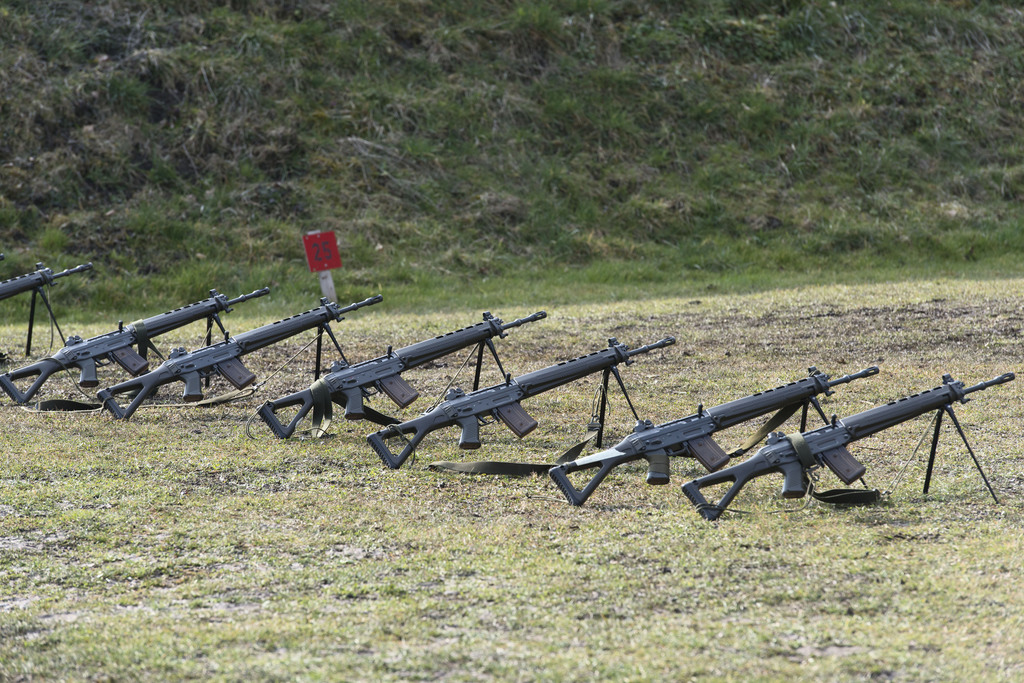
Colonel led shooting practice with North Koreans

In the latest incident to chip away at the Swiss army’s reputation, it has been revealed that a colonel and a lieutenant colonel led a shooting practice in Geneva, which was attended by two North Korean army officers who were visiting Switzerland.
Since 2011, eight North Koreans have studied at the Geneva Centre for Security Policy (GCSP), with the Swiss defence ministry covering the costs.
Faced with accusations of wasting taxpayers’ money, the ministry says the exercise is a useful course or the promotion of peace and security.
It said it wanted to enable “somewhat closed” countries to get a look at the rest of the world and “contribute to the opening up of these countries”.
On May 22, however, a reporter from the tabloid Blick hiding in a bush at a shooting range at Chancy, canton Geneva, filmed GCSP students – and the two North Korean officers – walking through the woods with Swiss rifles.
One student let off a rifle by mistake. No one was hurt. Click on the link to see the video.
Now Swiss Public Television, SRF, has learnt that the colonel who organised the shooting exercise, is a member of the General staff and is in charge of a high-level, sensitive army division based in the Zurich area. Electronic warfare and cryptographic or secure communication come under the division’s jurisdiction.
The defence ministry insisted that the GCSP had nothing to with this and the shooting event had been organised by a GCSP student.
The Military justice department has started an inquiry into the shooting practice.
What’s the point?
Regula Rytz, president of the Green Party, spoke of an “embarrassing scandal” – the army and the GCSP “appeared to be accomplices of the regime of injustice in North Korea”.
She said that if Ueli Maurer’s department didn’t thoroughly examine the incident, a government investigating committee would be set up.
The government was also criticised by the political right. Lukas Reimann, president of the campaign for an Independent and Neutral Switzerland, said: “In a neutral country such as Switzerland, there’s no way foreigners should be allowed to learn how to use weapons.”
Gerhard Pfister from the centre-right Christian Democrats pointed out that only people who were “blindly loyal” to the regime of Kim Jong-un were allowed to leave the country, and therefore he doubted whether there was any point in having North Koreans at the GCSP.
Lack of popular support
This is far from the first embarrassment to feature the defence ministry. In February, the Swiss Air Force was ridiculed around the world because it only has intervention capability during office hours.
The issue arose when a hijacked Ethiopian Airlines passenger plane landed in Geneva at about 6am on a Monday without the intervention of the Swiss Air Force. While Italian and French military aircraft were scrambled to accompany the plane, Switzerland was not able to deploy any jets because the air force’s offices were closed.
Because of budgetary constraints and noise restrictions, Switzerland’s air bases only operate 8am-12pm and 1.30pm-5pm – except on Monday nights when training exercises are held.
“If you want to invade Switzerland, do it at lunchtime” was a common headline around the world.
In 2007, 170 soldiers accidentally “invaded” neighbouring Liechtenstein having lost their bearings.
More recently, Ueli Maurer was on the painful end of direct democracy when voters turned down his request to spend CHF3.1 billion ($3.5 billion) on 22 Swedish Gripen fighter jets.
An editorial in the Blick on Monday said that instead of becoming the best army in the world, as Maurer has envisioned, instead the Swiss army was on the way to becoming the “most embarrassing army in the world”.
“As the Gripen result shows, popular support for the army is dwindling and mistrust in how officers while away their days is growing.”

In compliance with the JTI standards
More: SWI swissinfo.ch certified by the Journalism Trust Initiative

























You can find an overview of ongoing debates with our journalists here . Please join us!
If you want to start a conversation about a topic raised in this article or want to report factual errors, email us at english@swissinfo.ch.